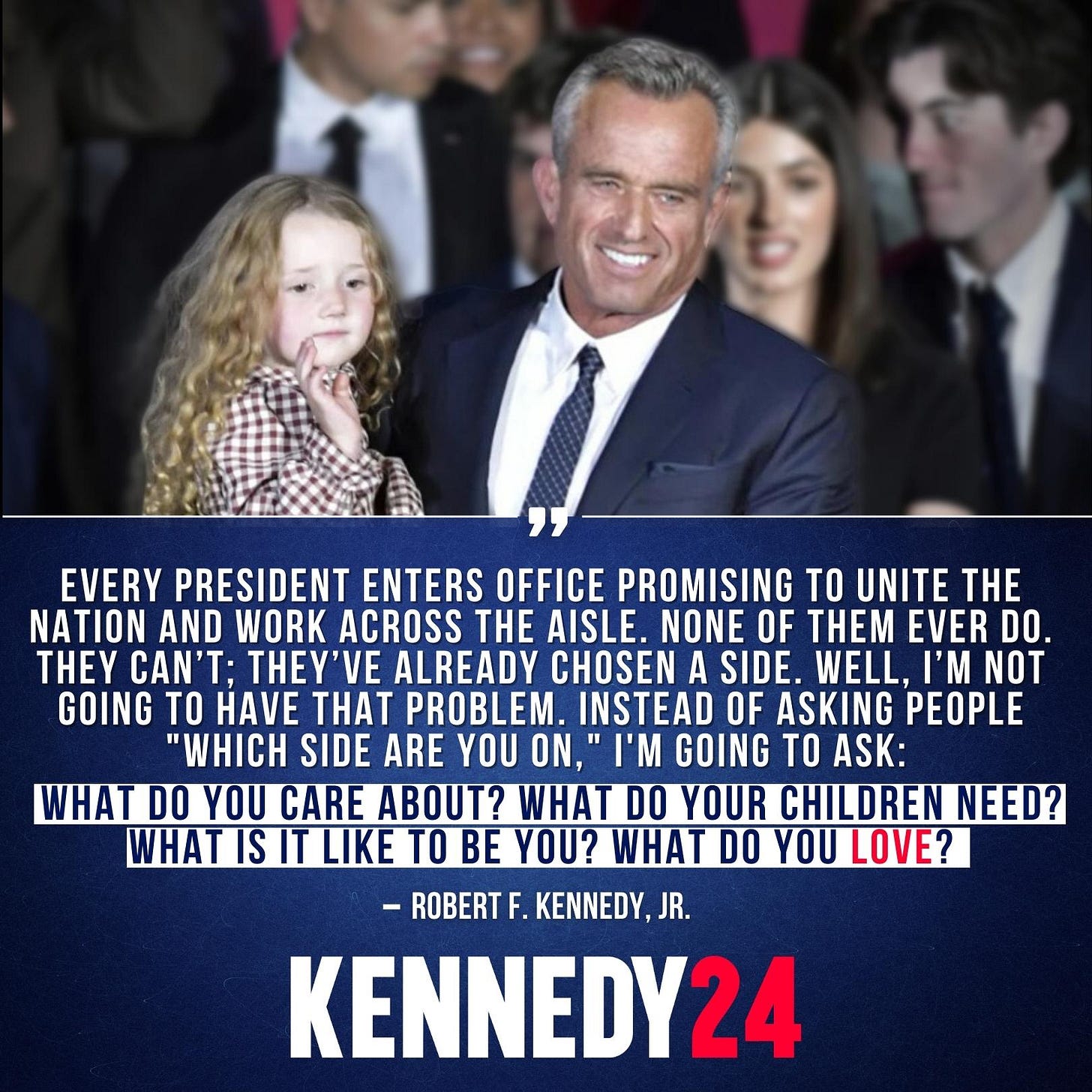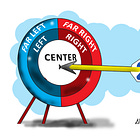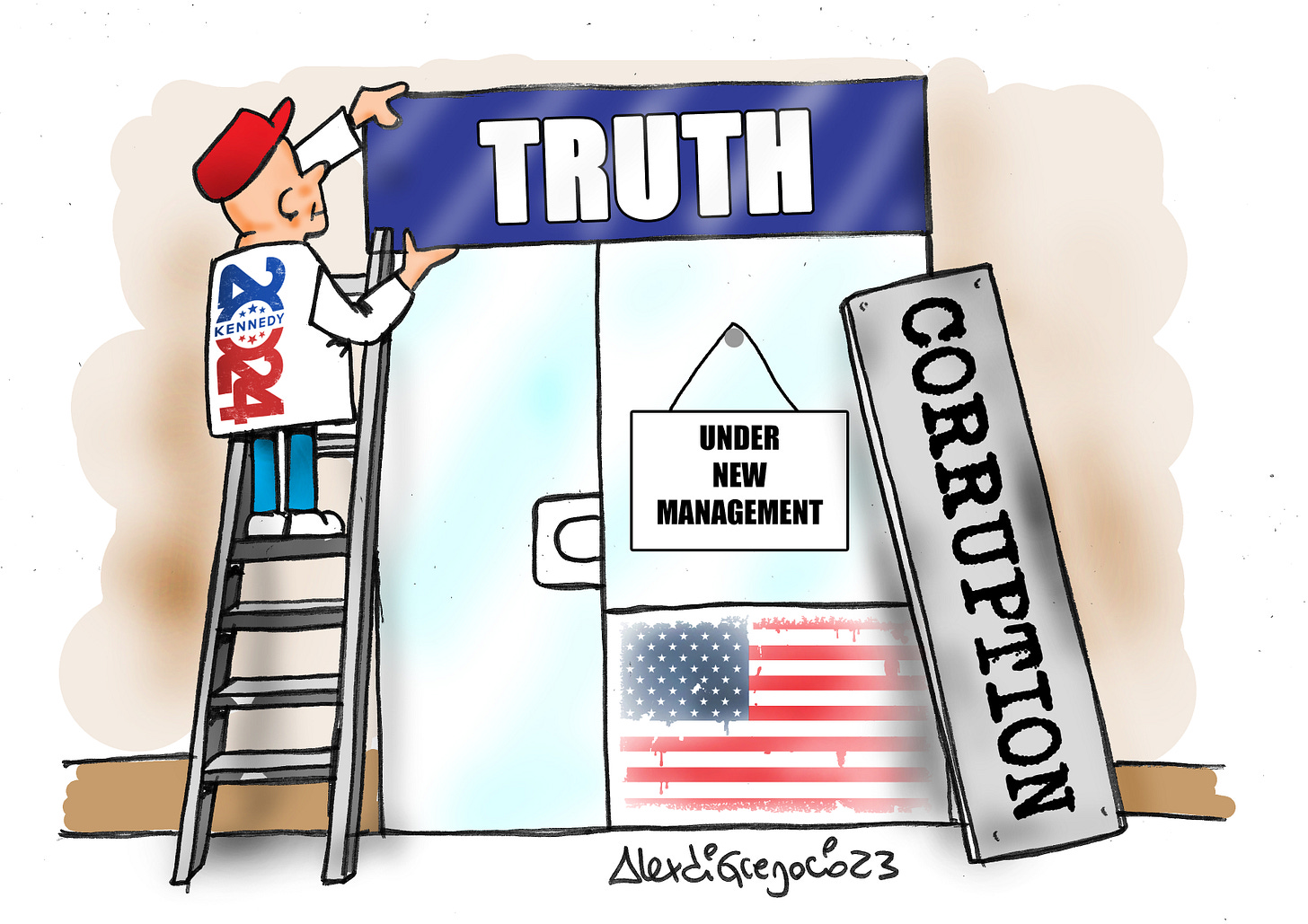RFK Jr.’s Journey: From Environmentalism, to Medical Activism, to Politics
By Nikos Biggs-Chiropolos, The Kennedy Beacon
By Nikos Biggs-Chiropolos, The Kennedy Beacon
On November 4, independent presidential candidate Robert F. Kennedy Jr. appeared in Savannah, Georgia at the second annual Children’s Health Defense (CHD) Rise & Resist: People Over Profits, Truth Over Lies, Courage Over Fear Conference. Kennedy’s keynote speech received a standing ovation. He was later honored with the organization’s Defender Award at the benefit dinner. Kennedy's appearance at the CHD conference provided a meaningful opportunity for him to connect his history of environmental and medical activism with his presidential campaign.
While the mainstream media, such as NBC, claimed that Kennedy had gone to Georgia to return to his so-called anti-vaxxer roots, his speech actually elucidated his position on vaccine safety. He also connected his environmental activism to his medical activism, explaining that both are rooted in his primary desire to improve the health of American children.

Kennedy began his speech by lauding the audience, stating that he is now running for President of the United States “thanks to you guys.” He used the context of his speech to remind the audience of the craziness of COVID-19 in the U.S. and later explained how he entered the medical freedom movement in the first place. Though Kennedy was speaking to a familiar audience, many of whom were aware of his legacy as a medical freedom advocate, his speech serves as a reminder of how he got to where he is today.
Early in his speech, Kennedy discussed the importance of citizens verifying facts for themselves noting that, if pediatricians will not do important medical research, then citizens — and often mothers — can and should demonstrate the initiative to perform medical research themselves.
He explained that during the COVID lockdowns, the truth was being deliberately obscured by authorities and the media, including the basic fact of the infection fatality rate compared with the flu. The hysteria presented in newspapers and on TV did not correlate with the data; age stratification was deliberately obscured to make it seem like everyone was at equal risk; basic questions were taboo, such as whether it made sense to wear masks, shut down the entire society, or mandate vaccines. We were told to bury facts and “trust the experts” — never mind that they did not all agree.
Kennedy recounted that he responded to this period of hysteria by locating and reading as many scientific studies about the virus as he could find and considering the views of dissenting physicians. He spoke of his desire for a forum where such debates are encouraged when considering important societal questions. He emphasized that while suppressing debate and requiring unquestioning obedience might be aspects of religious zeal or authoritarian governments, both suppression of critical dissent and blind obedience are inherently contradictory to science and democracy.
Kennedy recalled the media’s contempt during the COVID lockdowns for the individuals who questioned the “experts.” He reminded the audience that the so-called experts had their own biases and personal motivations, such as a desire for authority. Thus, the nuances and subtleties of critical inquiry were sacrificed at the altar of flashy PR slogans such as “stay home, save lives.” Kennedy described his vision of democracy, saying it can be messy, but it encourages transparency and debate. He segued to his own early activism, stating that he founded CHD as a repository for truth, and that he and the organization are happy to correct the record when they get things wrong, as should happen in a healthy democracy.
Kennedy described his journey to medical activism saying that he was “dragged kicking and screaming” into it after his career with Waterkeeper Alliance, where he spent years fighting environmental pollution. Waterkeeper’s mission is to advocate for, and restore the health of waterways so that Americans, and particularly children, can participate in the “seminal activity” of fishing. Because fishing requires healthy, pollution-free water sources and so many in America had become toxic, Kennedy was inspired to litigate against contaminators. As an attorney, he fought major polluters by challenging regulatory authorities to enforce long-neglected standards. Waterkeeper became a major success, with 350 member alliances in the US and in 46 countries around the world.
As Kennedy increased his involvement in clean water medical activism, he noticed that groups of women would regularly show up at his speeches to talk to, or even “accost” him, with stories of their children being harmed by vaccines. He noted that while his personal passions had been fisheries and wildlife and he was reluctant to get involved in vaccines, he was not willing to dismiss mothers’ concerns about the health of their children. Finally, Sarah Bridges showed up at his house in Massachusetts with a pile of studies about vaccine safety begging him to read them.
To the surprise of Bridges, Kennedy really did read through her documents, and his careful perusal of the data led him to question the safety of many prevalent childhood vaccines. He specifically asked the audience why the CDC recommends against pregnant women eating tuna because it contains too much mercury, yet simultaneously advises them to get flu vaccines that contain mercury. The same questions apply to the safety of blanket vaccination paradigms for children. Kennedy became convinced that this health issue was important. He committed himself to making health authorities ensure strict medical safety standards, the same way he had used Waterkeeper Alliance to force environmental authorities to hold polluters accountable. He published articles in Rolling Stone and Salon that questioned childhood vaccine regimens. The CDC decided to investigate the issue and commissioned a team to review vaccine safety data. Yet suddenly, these efforts were stonewalled.
The CDC organized a remote retreat to review the data and reportedly subsequently shielded the problematic data from public scrutiny by handing it over to a private agency. In a complete abdication of journalistic standards, Kennedy’s articles on vaccine safety were suddenly retracted — six years after publication — without notifying him or giving him the chance to defend his claims, as is normal journalistic practice. He discovered that, upon contacting the editors to ask their reasons for retracting the pieces that had previously passed rigorous, weeks long fact-checking reviews, they could not provide him any explanation. The only conclusion, Kennedy said, was that these government agencies and media outlets had caved to extreme pressure from the pharmaceutical companies.
He explained that this silencing strategy has been effective because, although the public reads claims about vaccine safety or entertains certain questions about potential dangers, most people lack the time or patience to actually locate and read dense scientific studies. Instead, they trust the authorities and follow standard advice. Yet what happens when the authorities are captured by corporate interests?
Kennedy’s solution was to write a book that pulled together all of the studies and evidence: Thimerosal: Let the Science Speak: The Evidence Supporting the Immediate Removal of Mercury – a Known Neurotoxin – from Vaccines. He said that 12 reviews disparaging the book were written before it was even available and that it ultimately “didn’t make a ripple.” So he joined the World Mercury Project, which ultimately became Children’s Health Defense (CHD).
Kennedy used his keynote address at the CHD conference to advocate for America’s children, stating that they are swimming “in a soup of toxicity” and litigation is required to hold corporate contaminators accountable and to re-prioritize public health.
The theme of accountability has become the backbone of Kennedy’s presidential campaign — government must become more accountable to the people it is serving and provide them with trust and transparency rather than disguising a corporate interest-driven agenda with palatable propaganda. The truth is not always easy or convenient to hear, but it is the key to individual and societal health and it is the core of Kennedy’s campaign.









There has been a war on the American people for decades. The polluting of our environment and bodies with chemical toxins and synthetic materials is an assault on our freedom, on our creativity, and on our well-being. This is the fight we need to win. Putting on the oxygen mask is crucial before we can help others.